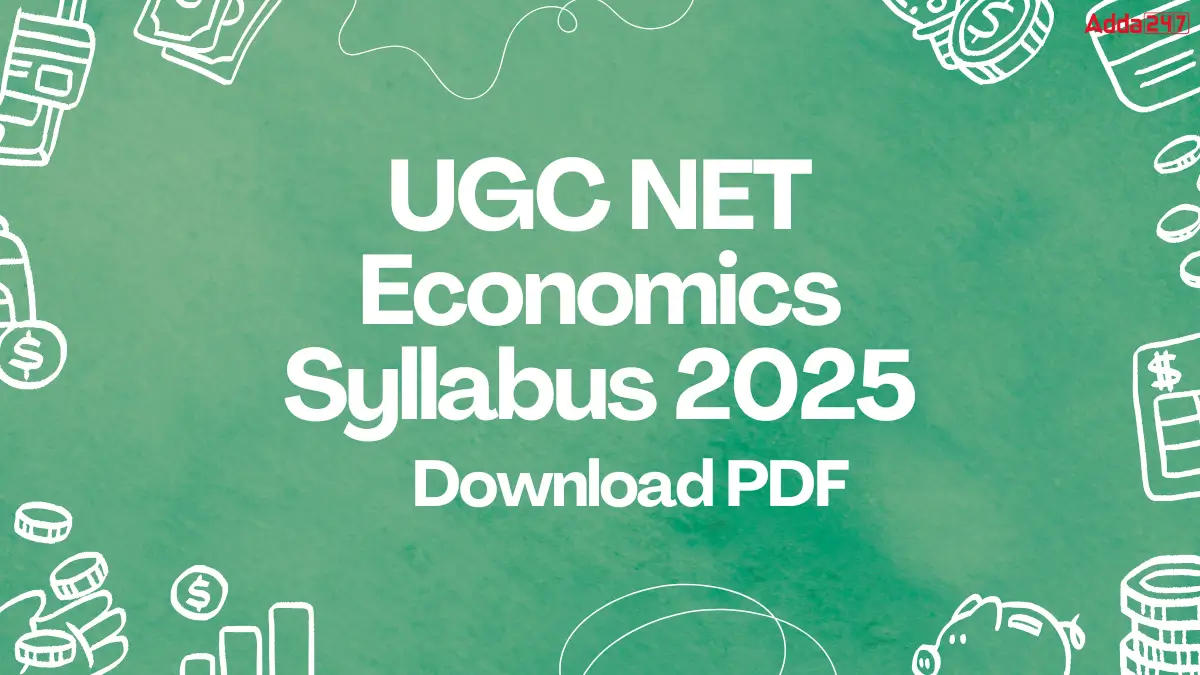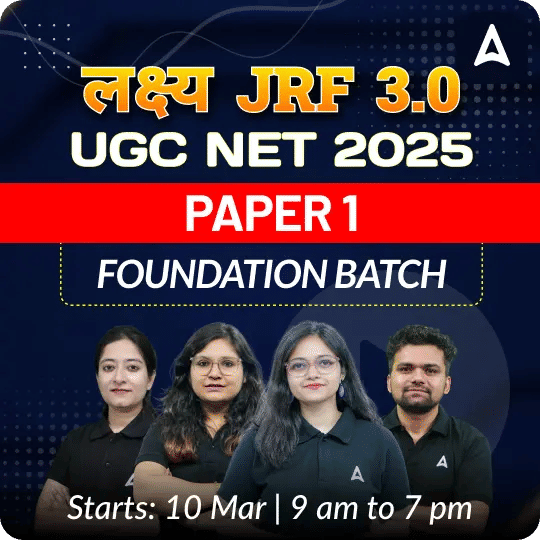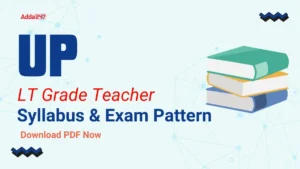Table of Contents
As the UGC NET 2025 exam for the June cycle is near by, candidates must begin their preparation, for which every aspirant needs a syllabus. UGC NET Syllabus 2025 for all 85 subjects is now available on the official website. For candidates opting for Economics as their subject, the UGC NET Economics Syllabus 2025 has also been released, serving as a crucial roadmap for exam preparation. With the UGC NET Exam approaching, aspirants must kickstart their studies strategically. To help you excel, we present a detailed, topic-wise breakdown of the UGC NET Economics Syllabus 2025, covering essential sections and key concepts for a structured and effective preparation.
UGC NET Economics Syllabus & Exam Pattern 2025
UGC NET Economics Examination will be held for 150 questions for 300 marks which will be done in 3 hrs. There will be 2 papers with no negative marking. Here lets us understand the details of the UGC NET Economics Exam pattern 2025.
| UGC NET Economics Syllabus & Exam Pattern 2025 | |
| Exam Name | UGC NET |
| Type of Questions | Multiple Choice Questions (MCQs) |
| Number of Papers |
|
| Total Marks | Paper I – 100, Paper II- 200 |
| Number of Questions | Paper I – 50, Paper II- 100; Total 150 Questions |
| Time Duration | 3 hours |
| Negative Marking | No |
UGC NET Paper 2 Marking Scheme
UGC NET Examination will be done in 2 papers without any breaks. Candidates who are preparing for the UGC NET Economics Examination should know about the exam marking system. UGC NET Economics Exam question pattern will be as Multiple Choice Questions which has to be completed in 3 hr. The following instructions will help the candidate understand the UGC NET Economics Examination Marking Scheme.
- Correct Answer Marking: 2 marks will be given for the correct answer
- Wrong Answer Marking: There will be no negative Marking for the wrong answer
UGC NET Minimum Qualifying Marks
NTA conducted this exam all over India in different centres. UGC NET Economics minimum qualifying marks have been given in the below table category-wise. The details for UGC NET Economics minimum qualifying marks have been mentioned below:
| Category | Qualifying Marks |
| General | 40% |
| OBC, SC, ST | 35% |
UGC NET Paper 2 Economics Syllabus
Here we are providing a detailed syllabus of the UGC NET Syllabus for Economics Subject Paper II which has been mentioned in the below table section wise.
Unit-1: Micro Economics
- Theory of Consumer Behaviour
- Theory of Production and Costs
- Decision making under uncertainty Attitude towards Risk
- Game Theory – Non-Cooperative games
- Market Structures, competitive and non-competitive equilibria, and their efficiency properties
- Factor Pricing
- General Equilibrium Analysis
- Efficiency Criteria: Pareto-Optimality, Kaldor – Hicks and Wealth Maximization
- Welfare Economics: Fundamental Theorems, Social Welfare Function
- Asymmetric Information: Adverse Selection and Moral Hazard
Unit-2: Macro Economics
- National Income: Concepts and Measurement
- Determination of output and employment: Classical & Keynesian Approach
- Consumption Function
- Investment Function
- Multiplier and Accelerator
- Demand for Money
- Supply of Money
- IS-LM Model Approach
- Inflation and Phillips Curve Analysis
- Business Cycles
- Monetary and Fiscal Policy
- Rational Expectation Hypothesis and its critique
Unit- 3: Statistics and Econometrics
- Probability Theory: Concepts of probability, Distributions, Moments, Central Limit theorem
- Descriptive Statistics – Measures of Central tendency & dispersions, Correlation, Index Numbers
- Sampling Methods & Sampling Distribution
- Statistical Inferences, Hypothesis testing
- Linear Regression Models and their properties – BLUE
- Identification Problem
- Simultaneous Equation Models – recursive and non-recursive
- Discrete choice models
- Time Series Analysis
Unit-4: Mathematical Economics
- Sets, functions and continuity, sequence, series
- Differential Calculus and its Applications
- Linear Algebra – Matrices, Vector Spaces
- Static Optimization Problems and their applications
- Input-Output Model, Linear Programming
- Difference and Differential equations with applications
Unit-5: International Economics
- International Trade: Basic concepts and analytical tools
- Theories of International Trade
- International Trade under imperfect competition
- Balance of Payments: Composition, Equilibrium and Disequilibrium and Adjustment Mechanisms
- Exchange Rate: Concepts and Theories
- Foreign Exchange Market and Arbitrage
- Gains from Trade, Terms of Trade, Trade Multiplier
- Tariff and Non-Tariff barriers to trade; Dumping
- GATT, WTO, and Regional Trade Blocks; Trade Policy Issues
- IMF & World Bank
Unit-6: Public Economics
- Market Failure and Remedial Measures: Asymmetric Information, Public Goods, Externality
- Regulation of Market – Collusion and Consumers’ Welfare
- Public Revenue: Tax & Non-Tax Revenue, Direct & Indirect Taxes, Progressive and non-progressive Taxation, Incidence and Effects of Taxation
- Public expenditure
- Public Debt and its management
- Public Budget and Budget Multiplier
- Fiscal Policy and its implications
Unit-7: Money and Banking
- Components of Money Supply
- Central Bank
- Commercial Banking
- Instruments and Working of Monetary Policy
- Non-banking Financial Institutions
- Capital Market and its Regulation
Unit-8: Growth and Development Economics
- Economic Growth and Economic Development
- Theories of Economic Development: Adam Smith, Ricardo, Marx, Schumpeter, Rostow, Balanced & Unbalanced growth, Big Push approach.
- Models of Economic Growth: Harrod-Domar, Solow, Robinson, Kaldor
- Technical progress – Disembodied & embodied; endogenous growth
- Indicators of Economic Development: PQLI, HDI, SDGs
- Poverty and Inequalities – Concepts and Measurement
- Social Sector Development: Health, Education, Gender
Unit-9: Environmental Economics and Demography
- Environment as a Public Good
- Market Failure
- Coase Theorem
- Cost-Benefit Analysis and Compensation Criteria
- Valuation of Environmental Goods
- Theories of Population
- Concepts and Measures: Fertility, Morbidity, Mortality
- Age Structure, Demographic Dividend
- Life Table
- Migration
Unit-10: Indian Economy
- Economic Growth in India: Pattern and Structure
- Agriculture: Pattern & Structure of Growth, Major Challenges, Policy Responses
- Industry: Pattern & Structure of Growth, Major Challenges, Policy Responses
- Services: Pattern & Structure of Growth, Major Challenges, Policy Responses
- Rural Development – Issues, Challenges & Policy Responses
- Urban Development – Issues, Challenges, and Policy Responses.
- Foreign Trade: Structure and Direction, BOP, Flow of Foreign Capital, Trade Policies
- Infrastructure Development: Physical and Social; Public-Private Partnerships
- Reforms in Land, Labour, and Capital Markets
- Centre-State Financial Relations and Finance Commissions of India; FRBM
- Poverty, Inequality & Unemployment
UGC NET Economics Syllabus Paper II PDF in Hindi and English
The direct link to download the UGC NET Economics Syllabus PDF 2025 in Hindi and English has been given below. Candidates can download UGC NET Paper 2 Economics Syllabus 2025 in both languages. All the candidates can prepare with important topics and unit-wise detailed syllabi in the below PDFs. The link to download the UGC NET Economics Syllabus PDF 2025 is given below.
| UGC NET Related Articles | |
| UGC NET Notification 2025 | UGC NET City Intimation 2025 |
| UGC NET Previous Year Question Paper | UGC NET Admit Card 2025 |




 UP LT Grade Teacher Syllabus and Exam Pa...
UP LT Grade Teacher Syllabus and Exam Pa...
 MP TET Varg 3 Syllabus and Exam Pattern ...
MP TET Varg 3 Syllabus and Exam Pattern ...
 Odisha LTR Teacher Mains Syllabus 2025 a...
Odisha LTR Teacher Mains Syllabus 2025 a...




